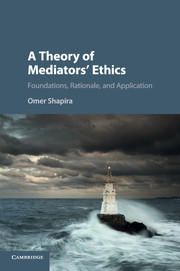Book contents
- Frontmatter
- Dedication
- Contents
- List of figures
- List of tables
- Preface
- Abbreviations of codes of conduct
- PART I A theory of professional ethics
- PART II A theory of mediators’ ethics
- 3 Mediation, mediators’ role, and mediators’ ethics
- 4 Party self-determination
- 5 Mediator competence
- 6 Conflicts of interest
- 7 Mediator impartiality
- 8 Professional integrity
- 9 Diligence, respect and dignity, and honesty
- 10 Confidentiality
- 11 Fairness
- 12 Maintaining the profession's standing and advancement of the profession
- 13 Advertising, solicitation, and mediator fees
- 14 Obligations to employers and principals
- PART III Dealing with ethical problems
- Appendix I A proposed model code of conduct for mediators
- Appendix II Model standards of conduct for mediators (2005)
- Bibliography
- Index
3 - Mediation, mediators’ role, and mediators’ ethics
from PART II - A theory of mediators’ ethics
Published online by Cambridge University Press: 05 March 2016
- Frontmatter
- Dedication
- Contents
- List of figures
- List of tables
- Preface
- Abbreviations of codes of conduct
- PART I A theory of professional ethics
- PART II A theory of mediators’ ethics
- 3 Mediation, mediators’ role, and mediators’ ethics
- 4 Party self-determination
- 5 Mediator competence
- 6 Conflicts of interest
- 7 Mediator impartiality
- 8 Professional integrity
- 9 Diligence, respect and dignity, and honesty
- 10 Confidentiality
- 11 Fairness
- 12 Maintaining the profession's standing and advancement of the profession
- 13 Advertising, solicitation, and mediator fees
- 14 Obligations to employers and principals
- PART III Dealing with ethical problems
- Appendix I A proposed model code of conduct for mediators
- Appendix II Model standards of conduct for mediators (2005)
- Bibliography
- Index
Summary
Introduction
A general theory of professional ethics having been presented in Part I, this chapter discusses the process of mediation and the role of mediators in Anglo-American countries in order to move from the ethics of professionals in general to the ethics of mediators in particular. The chapter begins with an exploration of the nature of mediation and the role of mediators, arguing on the basis of codes of conduct for mediators and mediation literature in Anglo-American countries that despite differences in style, mediation and mediators’ role have a core descriptive definition and shared professional ideals. The chapter goes on to establish on the basis of the codes and the literature a shared set of mediation norms that mediators are expected to follow. The product of the discussion is termed a perspective-from-below of mediators’ ethics, because the identified set of mediation norms reflects an internal understanding of mediators’ ethics from within the practice of mediation. The chapter then introduces a perspective-from-above of mediators’ ethics that reflects the application of a theory of professional ethics derived from role-morality to the core definition of mediation and the role of mediators. This exercise culminates in the establishment of a set of mediation norms that is compatible with both perspectives of mediators’ ethics and applies to mediators in Anglo-American societies regardless of style or type of case. The chapter ends with an explanation of the methods for ascertaining the content and meaning of these norms. These methods will be employed in the following chapters to produce a Proposed Model Code of Conduct for Mediators (Proposed Code).
The nature of mediation and the role of mediators: a core descriptive definition
One can learn about the nature of mediation and the role of mediators in Anglo-American societies from two main sources: mediation laws and formal codes of conduct for mediators that deal with mediation and define the process, its objectives, and the functions of mediators as understood by legislatures and professional organizations; and mediation literature that describes the evolution of the process, its philosophy, the social needs that it seeks to meet, its values, and common practices in carrying out the role of mediator. Codes of conduct for mediators and scholars offer various definitions of mediation and the role of mediators. There is no consensus on these issues, and mediations are practiced in different styles (or models) in a variety of conflicts.
- Type
- Chapter
- Information
- A Theory of Mediators' EthicsFoundations, Rationale, and Application, pp. 85 - 126Publisher: Cambridge University PressPrint publication year: 2016



